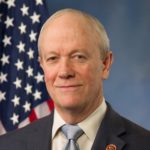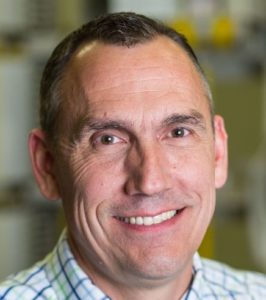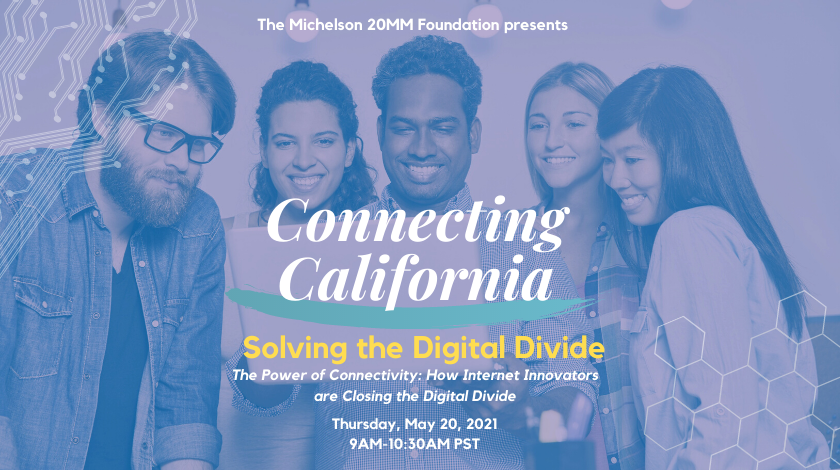Connecting California, Part V –– The Power of Connectivity:
How Internet Innovators are Closing the Digital Divide
Thursday, May 20, 2021 | 9:00-10:30 a.m. PDT
Click here to register
Join the Michelson 20MM Foundation on May 20, 2021, for The Power of Connectivity: How Internet Innovators Are Closing the Digital Divide.
As COVID-19 brought the urgent need for rapid and comprehensive connectivity solutions to the fore. In response, inventors, entrepreneurs, researchers, and other innovators from public and private sectors collaborated to rapidly develop technology and strategic partnerships for universal, affordable broadband internet access. During the next Connecting California event, a panel of bold, pragmatic experts will share their work and learnings from building solutions that can close the divide for all students, educators, and families.
In August 2020, Michelson 20MM launched its Connecting California learning series, which convenes the public, private and philanthropic sectors. Connecting California seeks to strengthen collective understanding of the history and root causes of the “digital divides”–the economic and educational gaps created by inequitable access to high-speed internet, computing devices, and digital literacy resources. Featuring business leaders, digital equity practitioners, philanthropic investors and policymakers, Connecting California provides a forum that speaks to different facets of the complex landscape for building digital equity solutions at national, state and local levels.
Speakers Include:
CONGRESSMAN JERRY MCNERNEY
U.S. Representative for California’s 9th Congressional District
 Jerry McNerney was sworn into office on January 4, 2007. He is proud to represent California’s 9th District, which includes a large portion of San Joaquin County and parts of Contra Costa and Sacramento Counties. Jerry is honored to serve on the Committee on Energy and Commerce, the oldest standing legislative committee in the U.S. House of Representatives, and the House Committee on Science, Space and Technology. He has a Ph.D. in mathematics and previously served as an engineering contractor as well as an energy consultant. During his career in wind energy, Jerry’s work contributed to saving the equivalent of approximately 30 million barrels of oil, or 8.3 million tons of carbon dioxide.
Jerry McNerney was sworn into office on January 4, 2007. He is proud to represent California’s 9th District, which includes a large portion of San Joaquin County and parts of Contra Costa and Sacramento Counties. Jerry is honored to serve on the Committee on Energy and Commerce, the oldest standing legislative committee in the U.S. House of Representatives, and the House Committee on Science, Space and Technology. He has a Ph.D. in mathematics and previously served as an engineering contractor as well as an energy consultant. During his career in wind energy, Jerry’s work contributed to saving the equivalent of approximately 30 million barrels of oil, or 8.3 million tons of carbon dioxide.
SETH HOEDL
President & Chief Science Officer, Post Road Foundation
 Seth A. Hoedl is the President, Chief Science Officer and Co-founder of the Post Road Foundation, a 501(c)(3) non-profit that develops new models for impact investment in infrastructure to help communities build a more sustainable and equitable future. Post Road focuses particularly on structuring intelligent infrastructure projects designed to eliminate the digital divide, reduce greenhouse gas emissions through advanced electric grid technologies, and drive adoption of cutting-edge educational, health care, and other broadband-enabled services.
Seth A. Hoedl is the President, Chief Science Officer and Co-founder of the Post Road Foundation, a 501(c)(3) non-profit that develops new models for impact investment in infrastructure to help communities build a more sustainable and equitable future. Post Road focuses particularly on structuring intelligent infrastructure projects designed to eliminate the digital divide, reduce greenhouse gas emissions through advanced electric grid technologies, and drive adoption of cutting-edge educational, health care, and other broadband-enabled services.
Prior to co-founding Post Road, Seth was an independent Energy and Climate Consultant and an experimental physicist. He has advised government, university and corporate clients on microgrids, distributed energy resources, and voluntary greenhouse gas emission reduction strategies. As a physicist, he helped run a biotech startup company as the Director of R&D and Chief Science Officer where he helped bring two medical devices for cancer therapy to market and raised several million dollars in non-dilutive financing. He has also built experiments looking for particles of dark matter.
JOANNE HOVIS
CEO, Coalition for Local Internet Choice; President, CTC Technology and Energy
 Joanne Hovis is a nationally recognized authority on broadband markets and on the evolving role of public–private partnerships in the provision of communications services to the public. For more than 20 years, she has directed CTC’s consulting services related to strategic planning, market analysis, business modeling, grant funding, and financial analysis for localities, states, and tribal governments throughout the country.
Joanne Hovis is a nationally recognized authority on broadband markets and on the evolving role of public–private partnerships in the provision of communications services to the public. For more than 20 years, she has directed CTC’s consulting services related to strategic planning, market analysis, business modeling, grant funding, and financial analysis for localities, states, and tribal governments throughout the country.
Joanne leads the CTC teams that advise the states of Alabama, Connecticut, Georgia, and New Mexico; the cities of Atlanta, Baltimore, Boston, New York, San Francisco, and Seattle; and the statewide broadband networks in Colorado, Maryland, and Pennsylvania. She also leads CTC’s advisory work regarding federal broadband funding programs.
Joanne has testified before Congress on rural broadband, broadband public‐private partnerships, and the digital divide, and has provided expert presentations to the Federal Communications Commission, the U.S. Conference of Mayors, the National League of Cities, and other national organizations.
Joanne is also CEO of the Coalition for Local Internet Choice (CLIC) and a member of the boards of directors of the Benton Institute for Broadband & Society, Consumer Reports, and the Fiber Broadband Association. She is a former president of the National Association of Telecommunications Officers and Advisors (NATOA).
BRUCE PATTERSON
Director of Technology, Entry Point Networks
 Bruce Patterson is the Director of EntryPoint’s Solution Services. Mr. Patterson is the recognized thought leader behind the ‘Ammon Model’ which focuses on the separation of infrastructure from services both technically and economically, thereby allowing the infrastructure to be treated as a true public utility while enabling private competition for services. During his tenure at the City of Ammon, Bruce was responsible for the creation and management of the Ammon Fiber Network. He managed everything from strategy and implementation including legal, public process, financial, construction, and technical aspects. It is Bruce’s work that has led to the Ammon Fiber Network being identified as the “Best Fiber Optic Network in America.”
Bruce Patterson is the Director of EntryPoint’s Solution Services. Mr. Patterson is the recognized thought leader behind the ‘Ammon Model’ which focuses on the separation of infrastructure from services both technically and economically, thereby allowing the infrastructure to be treated as a true public utility while enabling private competition for services. During his tenure at the City of Ammon, Bruce was responsible for the creation and management of the Ammon Fiber Network. He managed everything from strategy and implementation including legal, public process, financial, construction, and technical aspects. It is Bruce’s work that has led to the Ammon Fiber Network being identified as the “Best Fiber Optic Network in America.”
As Director of EntryPoint’s Solution Services, Mr. Patterson assists municipalities with network planning, feasibility analysis, network design, cost projections, construction oversight and network operations and management. Mr. Patterson believes that municipal fiber networks can and should be used for applications that go beyond “fast internet”. Applications such as emergency response and public safety. Mr. Patterson led Ammon to a first-place challenge award from the National Institute of Justice in 2015 with an ‘emergency screencast application’. The SDN infrastructure created by this challenge is still used today by the local public safety answering point to provide live video updates to local law enforcement when responding to events within Idaho Joint School District 93’s campuses. Mr. Patterson has also served as a co-principal investigator for two National Science Foundation research projects focused on public safety communications: NSF #1258486 – Network Slicing for Emergency Communications and NSF #1647264 –Dynamic Public Safety Response through a Municipal Software Defined Infrastructure.
PRESTON RHEA
Director of Engineering, Policy Program, Monkeybrains
 Preston Rhea has over a decade of experience in telecommunications engineering and public interest advocacy. As Director of Engineering, Policy Program at Monkeybrains, Preston coordinates partnerships with governments to build public fiber to affordable housing, breaks down barriers to affordable internet in large apartment buildings, and advances Monkeybrains’ gigabit network penetration in underserved areas. Preston developed the public policy program while managing the technician team at Monkeybrains for four years.
Preston Rhea has over a decade of experience in telecommunications engineering and public interest advocacy. As Director of Engineering, Policy Program at Monkeybrains, Preston coordinates partnerships with governments to build public fiber to affordable housing, breaks down barriers to affordable internet in large apartment buildings, and advances Monkeybrains’ gigabit network penetration in underserved areas. Preston developed the public policy program while managing the technician team at Monkeybrains for four years.
Prior to joining Monkeybrains in 2015, Preston worked at Code for America developing civic engagement practices with city governments and networks of civic technologists, developed and implemented a field curriculum for community wireless network deployment at the Open Technology Institute in Washington, DC, and worked at a content delivery network startup in Beijing, China. He holds a Bachelor of Science in electrical engineering from the Georgia Institute of Technology.
Moderated by: CHRISTOPHER MITCHELL
Director Community Broadband Networks Initiative, Institute for Local Self-Reliance
 Christopher Mitchell is the Director of the Community Broadband Networks Initiative with the Institute for Local Self-Reliance (ILSR) in Minneapolis. Mitchell created MuniNetworks.org, the comprehensive online clearinghouse of information about local government policies to improve Internet access. Their interactive community broadband network map tracks more than 500 such networks. He also hosts audio and video shows, including Community Broadband Bits, Connect This!, and Building Local Power. He tweets @communitynets.
Christopher Mitchell is the Director of the Community Broadband Networks Initiative with the Institute for Local Self-Reliance (ILSR) in Minneapolis. Mitchell created MuniNetworks.org, the comprehensive online clearinghouse of information about local government policies to improve Internet access. Their interactive community broadband network map tracks more than 500 such networks. He also hosts audio and video shows, including Community Broadband Bits, Connect This!, and Building Local Power. He tweets @communitynets.
Special Thanks to Our Foundation Partners
 If you missed our Connecting California events, you can find the recordings on our #ConnectingCA YouTube playlist.
If you missed our Connecting California events, you can find the recordings on our #ConnectingCA YouTube playlist.
Michelson 20MM was founded thanks to the generous support of renowned spinal surgeon and inventor Dr. Gary K. Michelson and his wife, Alya Michelson. The Michelson 20MM Foundation is dedicated to supporting and investing in leading organizations, technologies, and initiatives that seek to transform learning and improve access to educational opportunities that lead to a meaningful career. Learn more at www.20mm.org.



